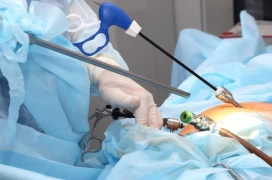
IVF Treatment
- IVF Treatment
- What is IVF Treatment?
- What are the Stages of IVF Treatment?
- What is the Success Rate of IVF Treatment?
- Can Multiple Pregnancy Occur in IVF Treatment?
- Which Medical Specialty is Responsible for IVF Treatment?
- What is the Cost of IVF Treatment?
What is IVF Treatment?
IVF (In vitro fertilization) treatment is a type of assisted reproductive technology that helps individuals or couples who have difficulty conceiving a child. IVF treatment involves combining eggs and sperm outside the body in a laboratory dish, and then transferring the resulting embryo(s) to the woman's uterus.
The IVF treatment process typically involves several steps, including ovulation induction, egg retrieval, sperm retrieval, fertilization, embryo culture, and embryo transfer. In some cases, pre-implantation genetic testing may also be performed to ensure the health of the embryo before transfer.
IVF treatment may be recommended for couples who have been trying to conceive for a long time without success, or for those who have certain medical conditions that make natural conception difficult or impossible. It may also be recommended for individuals who have undergone other fertility treatments without success.
The success rate of IVF treatment depends on several factors, including the age and health of the individuals involved, the quality of the eggs and sperm, and the skill and experience of the medical team performing the treatment. Overall, IVF treatment has a success rate of around 30-40% per cycle, although this may vary depending on individual circumstances.
What are the Stages of IVF Treatment?
IVF (In vitro fertilization) treatment is a multi-stage process, and the steps involved may vary depending on individual circumstances. However, the following are the general stages of IVF treatment:
- Ovulation induction: In this stage, the woman's natural ovulation cycle is regulated and prepared for egg retrieval using medications.
- Egg retrieval: After ovulation induction, the woman's eggs are collected with a needle guided by ultrasound.
- Sperm preparation: The man's sperm is collected and processed in the laboratory.
- Fertilization: The eggs and sperm are combined in the laboratory, and fertilization occurs.
- Embryo culture: The resulting embryos are cultured in the laboratory for several days to allow development.
- Embryo transfer: The best-quality embryos are selected and transferred into the woman's uterus using a catheter.
- Luteal phase support: Following embryo transfer, medications are used to support pregnancy formation during the luteal phase.
Each stage of IVF treatment requires specific skills and expertise, and should be performed by a qualified medical team. Additionally, the exact steps of the treatment and the length of the process may vary depending on individual circumstances, and should be determined by a qualified fertility specialist.
What is the Success Rate of IVF Treatment?
The success rate of IVF (In vitro fertilization) treatment can vary based on various factors, such as the age and health of the individuals involved, the cause of infertility, the quality of the eggs and sperm, and the number and quality of the embryos transferred. The success rate can also vary based on the clinic where the treatment is being performed and the experience of the medical team.
In general, the success rate of IVF treatment per cycle ranges from about 30% to 40% for women under 35 years of age, and it gradually decreases as the woman's age increases. For example, the success rate per cycle may be around 25% for women aged 35-37 years, 15% for women aged 38-40 years, and 6% for women aged over 40 years.
It's important to note that the success rate of IVF treatment is not guaranteed, and some couples may require multiple cycles of treatment to achieve a successful pregnancy. However, the advancements in IVF technology have increased the chances of success for many couples, and IVF treatment remains one of the most effective treatments for infertility.
Can Multiple Pregnancy Occur in IVF Treatment?
Yes, multiple pregnancy is a potential risk of IVF (In vitro fertilization) treatment. Since multiple embryos may be transferred into the uterus during the embryo transfer stage, there is a higher chance of having twins, triplets, or even more fetuses.
However, the number of embryos transferred can be controlled to reduce the risk of multiple pregnancies. In many cases, fertility clinics will limit the number of embryos that can be transferred to reduce the likelihood of multiple pregnancies. The exact number of embryos transferred will depend on various factors, such as the age and health of the woman and the quality of the embryos.
In some cases, if multiple high-quality embryos are available, some couples may choose to have more than one embryo transferred to increase their chances of a successful pregnancy. However, it's important to consider the potential risks and complications associated with multiple pregnancies, such as preterm labor and low birth weight.
Overall, while multiple pregnancy is a potential risk of IVF treatment, it can be managed by carefully controlling the number of embryos transferred and monitoring the pregnancy closely. Couples should discuss the risks and benefits of multiple pregnancy with their fertility specialist before undergoing IVF treatment.
Which Medical Specialty is Responsible for IVF Treatment?
IVF (In vitro fertilization) treatment is a complex medical procedure that involves several medical specialties. In general, the following medical professionals are involved in IVF treatment:
- Reproductive Endocrinologist: This is a medical doctor who specializes in the diagnosis and treatment of infertility and other reproductive disorders. The reproductive endocrinologist oversees the IVF treatment and may perform procedures such as egg retrieval and embryo transfer.
- Embryologist: This is a laboratory specialist who specializes in the handling and manipulation of eggs, sperm, and embryos. The embryologist is responsible for performing procedures such as fertilization, embryo culture, and embryo selection.
- Andrologist: This is a laboratory specialist who specializes in the analysis and processing of sperm. The andrologist is responsible for preparing the sperm for fertilization and ensuring its quality.
- Anesthesiologist: This is a medical doctor who specializes in administering anesthesia and monitoring the patient's vital signs during procedures such as egg retrieval.
- Nurse: IVF treatment involves multiple injections and medication regimens, so nurses play an important role in patient care and monitoring.
- Counselor: This is a mental health professional who provides emotional support and counseling for individuals and couples undergoing IVF treatment.
Overall, IVF treatment requires a team of medical professionals with specialized skills and expertise. The team may include medical doctors, laboratory specialists, and nurses, and they work together to provide the best possible care for patients undergoing IVF treatment.
What is the Cost of IVF Treatment?
The cost of IVF (In vitro fertilization) treatment can vary depending on a variety of factors and can differ from country to country and clinic to clinic. Additionally, the number of tests, medications, and procedures required for the treatment can also affect the cost. For example, in some countries, health insurance may cover IVF treatment, while in others, it may be entirely a private healthcare service.
In general, the cost of IVF treatment can be high and can significantly impact a couple's budget. For example, in the United States, the cost of IVF treatment can range from $12,000 to $15,000 for one cycle. In other countries, these numbers may be lower or higher.
The cost of IVF treatment can also vary based on the age of the couple, treatment requirements, and the location of the clinics. Some clinics may charge additional fees, while others may offer an all-inclusive price for all procedures. It is important for couples to communicate directly with an IVF clinic to learn all the details regarding treatment costs and to make a treatment plan.





